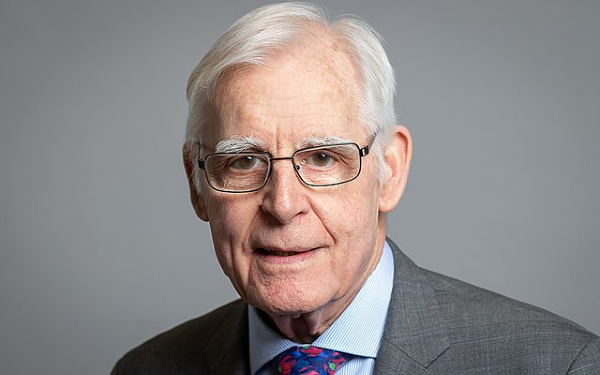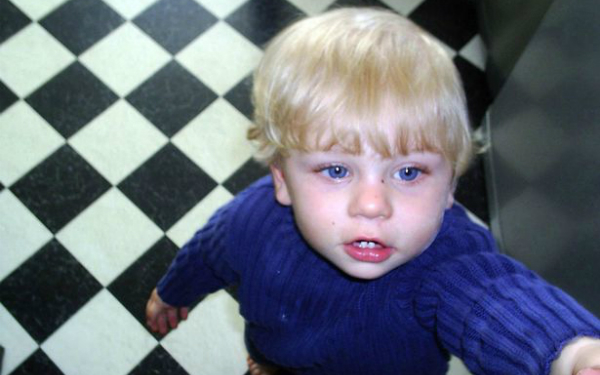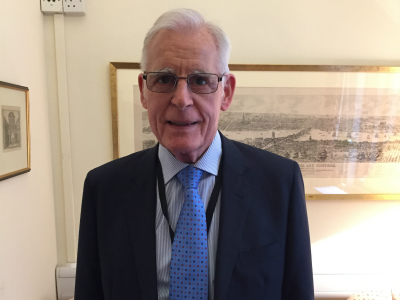
Our interview with Lord Herbert Laming is part of a new series of profiles of key figures who have shaped social work over the past five decades, to mark Community Care’s 50th anniversary.
More than 20 years after delivering his report into the death of Victoria Climbié, there is still a quiet sadness about Lord Herbert Laming at the mention of her name.
In 2001, the government tasked the former chief inspector of social services with chairing a statutory inquiry into the murder of the eight-year-old Ivorian girl by her great aunt, Marie-Therese Kouao, and Kouao’s boyfriend, Carl Manning the previous year.
The extent of the abuse Victoria had suffered shocked the country. Lord Laming’s report, published in 2003, called her a “victim of almost unimaginable cruelty”, with the post-mortem examination revealing 128 separate injuries to her body.
“It is the worst case of child abuse and neglect that I have ever seen,” said a hospital consultant who treated Victoria in her final days.
Yet almost as disconcerting were the several opportunities missed to save Victoria by the numerous services she had been in contact with prior to her death, including social services, hospitals and the police.
‘A gross failure of the system’
Lord Laming on the Victoria Climbié case

Victoria Climbié
While Laming acknowledged in his report that these agencies were “underfunded, inadequately staffed and poorly led”, he described Victoria’s death as an “inexcusable” and “gross failure of the system”.
Not one of the opportunities that arose to intervene required “great skill or would have made heavy demands on time to take some form of action”, his report concluded.
Looking back now, Laming says poor communication between services was the catalyst behind their failure to save Victoria. Several staff at the time uttered words to the effect of: “But had I known that, I would have acted differently.”
“The sad thing is [her situation] was known, but it was not shared with other services,” he says now.
Laming’s report made 108 recommendations, designed to increase the priority placed on children within government, local authorities and other agencies, enhance joint working and significantly improve the quality of practice by social workers and other agencies.
The then New Labour government implemented several through the Children Act 2004 and its wider Every Child Matters agenda, including requiring councils to appoint directors of children’s services.
The ‘Baby P case’ and Laming’s second report

Peter Connelly, who died in Haringey in August 2007
However, in 2008, child protection practice came under the microscope again following the convictions of those responsible for the death of 17-month-old Peter Connelly (‘Baby P’): his mother Tracy Connelly, stepdad Steven Barker and Barker’s brother, Jason Owens.
A serious case review found Peter’s “horrifying death could and should have been prevented”.
So the government called back Laming to review progress on child protection since his 2003 report. His second report, in 2009, praised Every Child Matters, including for prompting additional investment in preventive services, but warned that a “step change” was needed to protect children from harm.
This time, he made 58 recommendations, including further injunctions to strengthen accountability for children’s services, enhance inter-agency working, improve practice and boost funding for preventive and child protection services.
While the response from ministers again was positive, the report’s impact was critically undermined by its timing.
More child protection cases and less funding
The Peter Connelly case appeared to trigger a shift to more risk averse practice, as the number of child protection enquiries and plans and applications to take children into care rocketed.
Then, in 2010, the incoming coalition government embarked on its programme of public spending cuts to close the deficit created by the 2007-8 financial crisis.
As a result, local authority spending on children’s services fell by 9% in real-terms from 2010-11 to 2015-16, according to government-commissioned research. With the increase in child protection and care cases, expenditure on family support was squeezed.
Spending has since increased, but children’s services have faced new and different pressures, not least the experience and lasting impact of Covid-19 on the risks children face and the complexity of their needs.
Just in the last two years, child protection practice has been heavily criticised in the cases of six-year-old Arthur Labinjo-Hughes, one-year-old Star Hobson and, more recently, 10-month-old Finley Boden.
Laming’s doubts about child protection improvements
Lord Laming on whether there has been improvement in child protection since 2003
So, 21 years after his first report and 15 years after his second, has Laming found that things are better?
There was a time he would have said yes, he says. Unfortunately, he is no longer sure.
Laming attributes this in part to the decline in funding after 2010.

Lord Laming
“I think the financial cutbacks in recent years have led to each of the services withdrawing into themselves and I fear that sometimes they only act once the crisis has happened,” he says.
“I am a great believer that one of the strengths of social work is the opportunity to meet people at a time of pending crisis in their lives, to identify and assess what the issues are and [create] a plan of action that will help recover the situation.”
The need for children’s services to shift from crisis response to prevention was also a key conclusion from Josh MacAlister’s Independent Review of Children’s Social Care, which reported in 2022. It has also been adopted by the Department for Education in its 2023 strategy for the sector, Stable Homes, Built on Love.
Under this, some local authorities are testing a new model, ‘family help’, designed to provide families with earlier and more effective support to stave off crises and keep children at home, an approach broadly endorsed by Laming.
A preventive outlook, he adds, would not only keep children out of care, but save local authorities “a lot of money in the process”.
‘Realistic expectations needed’ for social workers
Lord Laming comments on the current funding crisis in social work
Yet, despite funding constraints, Laming notes that expectations for frontline staff have continued to climb higher.
“It’s no use to dream and want to live in a castle but only have the funding for a one-bedroom flat,” he says.
“I tell you we went through a phase where, if you read the objectives for social care services, there were lots of statements [with] the word ‘excellence’ featured a great deal. It’s no use saying to frontline staff our objective is ‘excellence’, but we’re not going to give you the resources to achieve anything like that.”
It is “people detached from the field”, he says, who continue to make important funding decisions. And so it is on councils and senior management to be “absolutely realistic, honest and open” with both social workers and the government about what can and can’t be achieved, he stresses.
“I don’t like putting staff in a position where the expectation is high, but they know that delivery will not be anything like that.”
Progress in practitioners’ expertise
Still, he acknowledges the “enormous” progress that has occurred in practitioners’ expertise and attitudes towards disability, mental health, alcoholism and drug addiction – and their work with families, local communities and the ageing population.
“I think that social workers have gotten a much better understanding of their role, responsibilities and their powers.”
And it’s not that he hasn’t encountered exemplary work in social services – he has met remarkable people. But, the crossbench peer says, some of that outstanding work has been lost.
“Not because of the lack of enthusiasm, professionalism or commitment, but because the resources have been taken away. Frontline staff have found themselves constricted in what they can do and how much time they can give.”
Social work ‘needs to be purposeful’
Lord Laming on why social work needs to be purposeful
There is eloquence in the way Laming speaks. His careful answers are preceded by long pauses where he deliberates on each question to ensure the message is, as he would say, purposeful.
It is a word he thinks needs to be connected more with the work social services do.
“Each of the reports that have happened since [Victoria] into awful deaths of children have highlighted some of the same issues about not sharing information, about not having an action plan,” he says.
“The thing about social work is it can go on for years with the same individuals, but it’s got to be purposeful. I personally attach a lot of importance to the discipline of doing a thorough assessment of where we are, whether or not there’s been progress and whether it’s gone in the right direction.”
He recalls his start in probation services in the 1960s when he had to be very disciplined and clear in the plans he made for individuals placed under a probation order.
Later, as a social worker, he never went on a home visit without being transparent about what the purpose of his visit was, he says.
“I’m very clear that in social work it’s not about the chat. It’s not about having a cup of tea. These things might help but it’s about the purpose behind being there.”
Assessments ‘are about using your senses’
In the past, he has witnessed that ‘purpose’ lacking in assessments of potential children in need.
An assessment should not be a tick-box evaluation, but instead one based on basic senses, he says.
“Go in and use your eyes. See how the adults relate to each other, how the child or children relate to the adults. Do they go rushing up for comfort and reassurance or cower? Smell – is this place neglected or not? Use your ears. What am I hearing about how they address each other? Is it antagonistic or disparaging? Where are the toys?
“So when you walk out of your visit you’ve got a good picture of the family dynamics. You won’t get everything all at once, but you’ll get a reasonable idea of whether or not that is a child-centred home.”
More direct work, less paperwork needed

(credit StockPhotoPro / Adobe Stock)
Laming is the first to admit that nowadays he is far more removed from the sector and the daily realities of social work than he used to be.
However, pressures on social workers mean that his vision for assessment feels as far away as ever.
A poll of 716 practitioners by the Social Workers Union recently revealed that 58% find their workload either not at all or only partially manageable. And in 2022, children’s social workers reported spending 59% of their working time doing case-related paperwork.
Laming is very candid about his displeasure towards senior leadership about this administrative burden.
“I really don’t understand it. When social workers [tell me] that, I want to ask, ‘Does the director of children’s services or your senior management know that?’. Because you’re employed as a frontline worker to work with people. There must be a way of ensuring that the bureaucratic stuff can be kept in its place. I’m all for record-keeping – I’ve read too many bad records [as a chief inspector]- but it is a means to an end. The end is the child.
“We’ve never had such a means of easy communication as we have now. What we mustn’t do is make it the master. It is the servant and enabler. It is the thing that releases the social worker to get out and do the main part of their job.”
A child’s journey through services
These days, Laming is also concerned about the link between children’s and adults’ services, particularly issues that arise when a young person transitions from the former to the latter.
Laming tells me of a severely disabled young adult who, until the age of 18, had been well supported by children’s services. But upon reaching adulthood, when the child got referred to adults’ services, it was as if the young person’s history with children’s services had been erased.
“They started again as if there was no previous contact with this child. An early social history had to be taken and a new file had to be created, etc. And I think to myself, we’ve got to see the whole person.
“But then I’ve also seen some wonderful work where adults’ services were brought in when the child was some years away from finishing school and the authority arranged for prospective employers to be engaged.”
Ultimately, for him, this sums up the problem in children’s services. You always “get the extremes” – a child that has had a wonderful experience and one that was failed.
“What I want to see is the good stuff, the exceptional stuff that is out there, to become the standard stuff everywhere.”
Which influential figures in social work would you like to see Community Care interview?





 Assistive technology and dementia: practice tips
Assistive technology and dementia: practice tips  A trauma-informed approach to social work: practice tips
A trauma-informed approach to social work: practice tips 




 Find out how to develop your emotional resilience with our free downloadable guide
Find out how to develop your emotional resilience with our free downloadable guide  Develop your social work career with Community Care’s Careers and Training Guide
Develop your social work career with Community Care’s Careers and Training Guide  ‘Dear Sajid Javid: please end the inappropriate detention of autistic people and those with learning disabilities’
‘Dear Sajid Javid: please end the inappropriate detention of autistic people and those with learning disabilities’ Ofsted calls for power to scrutinise children’s home groups
Ofsted calls for power to scrutinise children’s home groups Seven in eight commissioners paying below ‘minimum rate for home care’
Seven in eight commissioners paying below ‘minimum rate for home care’
 Facebook
Facebook X
X LinkedIn
LinkedIn Instagram
Instagram
This is a powerful and significant reflection on the history of child safeguarding and the tragic consequences for children when this is delivered at a low level of resources, expertise and determination. There continues to be regular messaging about children who continue to be injured or killed by family members.
There is no doubt that this area of work demands a focused engagement with the child while being clear and straightforward with the adults about the risks to the child and the source of those risks. The combination of the focus on the child and focus on the adults is not an easy one. For professionals, there will be compliance with organisational due process and accountability while creating a direct, honest, relationship with the family which is sensitive, realistic, and child-centred.
In his original enquiry I recall reading that Laming recorded Social Workers reported on returning from a weekend off or returning from annual leave to find files on their desks as a means of allocation of new cases. This was 20+ years ago. My experience is that Team Managers still allocate without direct discussion with Social Workers as to their capacity. No lessons being learned, eh?
Not already submitted
Laming is well meaning and we all as Social Workers completely acknowledge his current and historic findings. However as he stressed then and now, we are falling short in our abilities to safeguard vulnerable children. As already discussed, Social Workers are working over and above yet results continue to be disappointing. The answers are simple – enable practioners the time to fully engage with a case / a concern / a child – this means cutting the number of cases to what they are currently to at least half of current figures. Sadly this will cost a lot of money so I know the Government’s response, and thus more incidents will occur.
It is the ‘needs’ of Government which are being ‘ met’. Children and their families are dependent on food banks, a basic need for any growing child.
It was said in the 1980’s … there is no such thing as society. Children are experiencing harm in many ways as a result of underfunding, most social workers I have known care about children and their families , the only politics social work responds to is the Government of the day. Most families I have worked with do not understand the power of the vote, because of their lack of education, which again is impacting on the many, not the few.
“ Try and argue, present a case for S17 funding”. As a survivor of the 1960’s care system, who could not read until the age of 13 I went to university in the 1990’ s and clearly remember the Utting report. Services to children and their families have reduced year on year, cuts in education, professionals being the ‘ eyes and ears of the state’ and reporting rather than equalising the wealth of knowledge. As a society we have a duty to support the vulnerable, disadvantaged, not just social workers, teachers, police officers, health professionals.
I am still a registered social worker beyond retirement age I am passionate about protecting, feeding, educating children, our future.
Do managers in Children’s Services have any respect for the 37 hour working week, and the importance of this regarding supporting Social Workers in their difficult and stressful tasks? I think not. They take goodwill working for granted
Come on!
The inquiry into the death of Victoria Climbe ignored the findings of the death of Toni Ann Byfield.
They are politically orchestrated. Check out the party political fight over the terms of reference for an inquiry into failings in Calderdale and Kirklees following Rotherham.
Two children’s deaths in Sunderland, 2014 while satisfying the terms and conditions of the serious case review failed to take full account of the actual operating environment. Having asked Lord Laming, prompted before 2014 by BASW branch members, to register serious misgivings I still have no reply.
In this instance a agency worker from the US was hung out to dry.
To talk of improvements in drug and alcohol services, like most disabilities services, has been with a blind adherence to theory and practice ill-suited to and not derived from social work.
When Eileen Munroe was asked to attend the, then, Government response to the death of Peter Connelly she didn’t even know she was going to be asked to lead on drafting ‘Working Together’ .
On her arrival she was somply landed with it.
Saying, as Prof Munroe, did at the time of drafting the guidelines that social work is a complex adaptive system and relational ignored that these words have specific meaning within the world of Enterprise Architecture for IT development.
Ever since Westminster Council and in the early 1980s developed UCare, the 1st generation of IT kit, there’s been woeful attention paid to the actual benefits of such kit. The same happened throughout Youth Justice in the noughties and became the real economic driver throughout the drug and alcohol services ~ the at your finger tips demands for information has had absolutely nothing to do with keeping children safe.
The tail has been wagging the dog for decades.
The BASW AGM 2007, based on a show of hands, returned a vote of no-confidence in the, even then, blind faith being invested in going Digital and interoperability, and especially in Youth Justice ~ I became an IRO as part of the post Climbe review; the administrative arrangements hadn’t eased but had doubled. The data set construction and descriptors needed for performance management requirements meant that social workers were having to write additional reports, having already negotiated all manor of drop-down options, and attach them to the files ~ unless you knew such existed such reports are irretrievable because they aren’t coded.
Let’s get real about what is going on, eh? The MacAlister Review remains incomplete ~ information management requirements being one crucial factor being ignored and like for over 40 years since the Westminster experiment.
And, experiment it is.
For cpd see Xin Wei Sha Navigating Indeterminacy for an accurate definition of the terms complex adaptive systems and the word ‘relational’.
Alec
Why do you baffle people with language. “For cpd see Xin Wei Sha Navigating….. ” Means absolutely nothing to me
Xin Wei Sha (Sha Xin Wei) is today, perhaps, one of the worlds leading authorities on the errors made by an over reliance on computational information … being baffled is the area he writes and blogs about maybe you should have a look at his work ….
John I totally agree with your statement. Social services is a service which is necessary to ensure all children are safe,this is a service we may all have to access at some point regardless of whether it is Adult services or Children’s Services.In my view the service as lost direction.This is worrying.
Mobile working,attitudes,tick boxes, and performance indicates in my view do not reflect the true value of the work most social workers are attempting to achieve. Without support systems such as administrative support,management support,respect of each others skills knowledge,contributions and IT support which is now a fundamental part of the work social workers have to use to support them in Safeguarding Children this is very much missing and only impacts the quality of work..
Since the Victoria Climbi enquiry what has changed i ask myself ? It appears more children are suffering significant harm due to a system which works against the work social workers are attempting to do.
Covid brought with it confusion/uncertainty,less focus on good pratice and a lack of directions yet agency staff were employed to carry out the work of permanent staff? Is it not time to ensure social workers are equipped with the right support on all basis to ensure we deliver safe professional practice.
There is no doubt practice procedures in social work is changing because of the digital world we are now expected to live in, however mobile working does not make the role any easier if you do not have the support behind it.
Attitudes and behaviour in social work have changed!!?.This is worrying to observe.
Reports are life changing for a child and should reflect that child’s individual lived experince having to rushing a report in a limted time frame because you have only been given a couple of weeks or having a nicely written report which does not tell you anything about the child, may not bring that child’s lived experince to life.
If Social workers do not have access to support system’s which enables them to provide a valuable service, gives a picture of the child’s lived experience how can you blame social workers, if timescales are unmanable,case loads are dangerously high does this not impact the quality of service children receive(You can not fit a square peg into a round hole no matter how much you try) surly this is obvious?
The service is now target load and although I recognise delay can significantly impacts on the out come for a vulnerable child, in my view the child /adult has a human being is being lost.Did we not enter social work to advocate for the rights and Safeguarding of all children who face abuse? Therefore social workers should be equipped with the right support right attitudes to enable a professional service which reflects what most social workers in the profession are attempting to do does it not?
Social work requires many skills to pratice effectively.Your work must always be evidence based if you are to provide a safe and effective service.During the day you may be using different forms of intervention without being aware of it these may involve Micro,Mezzo,and Macro social work interventions.
My point is social work is complex and is not only about tick boxes or “have you recorded your visits” without the recordinds not having some value to the content.Social workers are crying out for managable case loads, space to reflect and even scrutinise documents before having to start another task so they can provide safe effective service’s which not only safeguard children but also bring some credibility to the profession.
Micro social work requires the social worker to work with families/ children direct work with children will be on a one to one basis, and requires the ability to form good working relationships.How can a professional do this if you are moving from one allocated case to another one this limits your capacity to form any form of working relationship with the child/ families.Perhaps this needs addressing.
Mezzo social work requires social workers to engage with other organisations and professionals to access relevent resources,feedback and collaboration to inform assessments.Communicating with other professionals can be difficult because each bring thier own agendas to the meeting, you must be able to identify this because this interaction can limit the process of a plan.(Sorry but this is true) if your manager does not support you this again will impact the progression of the plan.
Macro social work involves identifying research to inform practice,advocacy,admin work,each intervention interlink with each other.How can professionals carryout this task if you do not have time,does this not impacts effective practice?
I apologise for repeating myself the role social workers take on are not only complex,affects one’s emotional well being,requires focus, confidence in leadership not one of blame and belittlement.
These are just some of my views from experince all of which impacts the quality of service we has social workers attempt to deliver.